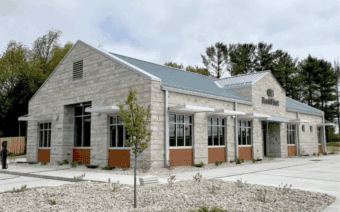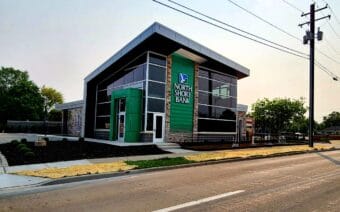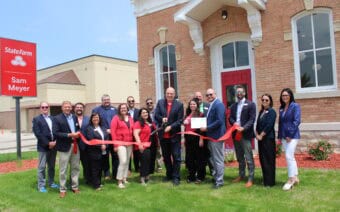
February 24, 2023
WISCONSIN – For small business owners, operating competitively through a fluctuating economy can be a challenge for a multitude of reasons.
To help in these endeavors, entrepreneurs in Marinette County now have more opportunities for growth, as well as the ability to market their businesses to federal buyers through the HUBZone program.
Maintained by the Small Business Association (SBA), Historically Underutilized Business Zones — also referred to as HUBZones — give preferential consideration to qualifying small businesses in open competition.
Geri Aglipay, the Great Lakes Regional Administrator for the U.S. Small Business Association (SBA), said the program’s goal is to create jobs within communities with economic needs by incentivizing the U.S. federal government to contract with small businesses.
With the U.S. government being the largest purchaser of goods and services in the world, Aglipay said a working relationship could have a substantial financial impact.
According to the SBA, during the 2021 fiscal year, the federal government purchased $145.9 billion in goods and services from U.S. small businesses with $1.1 billion coming from Wisconsin alone.
Likewise, the SBA said HUBZone-certified small businesses in Wisconsin secured $54 million in federal contracts in the same fiscal year.
As these numbers are expected to continually increase, Aglipay said the HUBZone program could prove to be a pivotal asset to small businesses around the state.
“HUBZone-certified businesses are in demand,” she said. “This is a good time for small businesses to get HUBZone certified, and more broadly, to enter the federal contracting marketplace.”
Aglipay said currently in Wisconsin, there are 56 HUBZone-certified small businesses, which span 12 counties.
“Federal contracting, including the HUBZone certification, can be a viable revenue source for business owners and help them build wealth for themselves, their employees and their communities,” she said. “HUBZones help small businesses hire from their local communities, especially those who live in underserved areas.”
The SBA sees recent legislation, notably the Bipartisan Infrastructure Law, passed under the President Joe Biden Administration, as groundbreaking for the HUBZone program – aimed at tipping the scales on credible competition.
?“Billions of dollars are flowing into the contracting arena to implement the law,” Aglipay said. “This translates into big opportunities for small businesses.”
Along with the ability to pursue contracted work, Aglipay said small businesses are competing at a price advantage.
“The federal government, and their prime contractors, have goals to meet for small businesses contracting,” she said. “There’s an incentive to work with small businesses.”
According to the SBA, the federal government’s goal is to award 3% of all prime and subcontracting dollars to businesses in the HUBZone program each year.
Becoming HUBZone certified allows businesses to compete for the program’s set-aside contracts.
First of many steps
Shirah Rachel Apple, a public affairs specialist at the Wisconsin District Office for the U.S. Small Business Administration, said Marinette County’s designation as a HUBZone – which became official last fall when Gov. Tony Evers’ application to the SBA was approved – is “the first step.”
“Once (businesses) submit everything, the SBA will review it, and hopefully approve it if all the criteria are met,” she said.
To qualify, Apple said small businesses must meet one or more of the requirements, which includes being 51% owned and controlled by U.S. citizens or a Community Development Corporation.

Geri Aglipay
Further, she said the company’s principal office must be in a HUBZone, with 35% of its workforce residing within the boundaries of the HUBZone.
“Federal contracting certifications, and competing for contracts, takes a real commitment,” Apple said. “But it can also bring great payoffs for the business in the form of major contracts.”
As a result of the HUBZones, Apple said many small businesses in Wisconsin are landing multi-million dollar contracts with the federal government.
“Others are getting small contracts but regularly compete successfully in the federal marketplace,” she said. “As a result… (it’s) a significant revenue stream for their companies.”
Shane Mahaffy, a lead business opportunity specialist for the SBA, said he encourages small businesses to consider applying for HUBZone certification, noting the benefits are a motivating factor.
“Federal contracting allows small businesses to diversify their contract portfolio and add another revenue stream,” he said. “Firms should carefully review the SBA webpage for the HUBZone qualifications.”
Mahaffy said the approval process takes about 60 days.
HUBZone regulations require all certified HUBZone firms to recertify annually.
Those businesses that become HUBZone certified can bid on contracts reserved for HUBZone businesses, as well as receive 10% price evaluation preference in full and open competition procurements.
HUBZone-certified businesses can also receive coaching and training about business plans, marketing, government contracting and financing through SBA’s website and network of partners.
Recently designated
Each year, Aglipay said on average, 3,000 entities register for a HUBZone certification, an expansive and economy-stimulating effort.
Marinette and Jackson County are the Badger State’s most recent HUBZone designated counties.
“I just visited these two counties, along with my Wisconsin staff, to promote the new HUBZone,” Aglipay said.
With the designation now underway, economic development organizations are helping educate business owners on the value and benefits of getting HUBZoned-certified.
Jennifer Short, the development and tourism director for Marinette County, said joining the HUBZone program is an exciting leap.
“In November, we learned of our acceptance and began planning for how to educate Marinette County businesses about this opportunity,” she said.
Short said entering the program will provide Marinette County businesses with preferred consideration for bids on government contracts.
“We want businesses to think big about how their goods and services can support the work of government procurement – from grass cutting at a government building to providing parts for a warship,” she said. “Just as there are certifications for veteran-, minority-, women-owned businesses… This provides an additional opportunity for businesses in our country for their goods and services to be considered by government contractors all across the United States.”
The SBA, Wisconsin Procurement Institute, Wisconsin Office of Rural Prosperity and the Wisconsin Economic Development Corporation (WEDC) recently held an informational meeting and training session in Marinette County.
“The HUBZone opportunity was first introduced to us by a WEDC regional director,” Short said. “The Marinette Menominee Area Chamber of Commerce and Marinette County Development & Tourism explored the opportunity for our businesses and joined with WEDC and their effort for Governor Evers to petition the SBA to be selected for the ‘Governor-Designated Covered Area.’”
Broad impact
Aglipay said the program benefits more than just those that are HUBZone-certified as well.
“HUBZone contracts for certified businesses enable businesses to hire and bring dollars into their communities,” she said. “Those jobs spurred by small businesses help generate household savings, as well as spending dollars.”
Aglipay said those funds would then be re-circulated in the neighborhoods and reinvested back into the community.
Small businesses, in both rural and urban areas, can check their business address via the HUBZone map, which is accessible online at sba.gov/hubzone to confirm HUBZone status.
Those looking for assistance with the application process for the HUBZone program can contact the Wisconsin Apex Accelerator, Wisconsin Procurement Institute (WPI) – a nonprofit that assists small businesses with complimentary local, state and federal contracting support.
WPI can be reached at (414) 270-3600 and at wispro.org.
 A new standard in electric refuse and recycling collection
A new standard in electric refuse and recycling collection Providing customers with ‘sunshine after sunset’
Providing customers with ‘sunshine after sunset’







